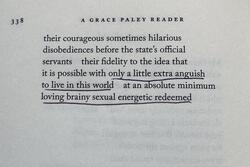Go See "Selma"
I cried six times during the movie Selma. Each time for a different reason, and with varying durations/intensities. Within the first few minutes I had tears of mourning and shock running down my face. At one point I broke into sobs of sorrow. When I saw the home of Richie Jean Sherrod Jackson, where I had been two years before to meet her and hear her incredible story, I wept with joy at seeing her legacy commemorated and sadness that we lost her last spring.
But the moment that got me the most was when when I saw police kill an unarmed young Black man. I choked tears into my scarf and said to myself “same shit, different decade.”
But my last good cry was during the credits, when John Legend’s beautiful new song, “Glory,” played over the scrolling names. His voice, as usual, made my spirit lift. And then rapper/star of the film Common laid down some truth in a verse:
“Justice for all just ain't specific enough
One son died, his spirit is revisitin' us
Truant livin' livin' in us, resistance is us
That's why Rosa sat on the bus
That's why we walk through Ferguson with our hands up”
I don’t want this to be about me, a white Jewish lady, feeling moved by the incredible film Ava DuVernay has gifted to the world. That’s not what this experience was about. I was there to bear witness to a beautiful historical film. Not perfectly accurate, not unflawed, but fantastically acted, well written, a triumph.
What a time for this film to come out, filled with incredible Black actors telling the story of those who forged the way for voting rights, for desegregation, for justice in America. When we stand on the precipice of another movement, Selma reminds us of where we’ve been and what must happen to move forward. The fight isn’t easy, it’s complex, and it’s not always about the white Jewish lady feeling moved in the back row.
Selma was a jolt to my system—another reminder of my white privilege, of my ability to forget about the struggle because I exist in a world where I can move easily from one space to the next due to my race. I don’t fear my appearance will threaten others, will risk my arrest, or put my safety in jeopardy. The #BlackLivesMatter movement which I hope to continue to support in whatever way the leadership needs from me/us is one I can shelf if I so choose. I think about it every day, yes, but I don’t live it. And watching Dr. King, Hosea Williams, James Bevel, and Annie Cooper reminded me that the fight is long and it’s bloody and I need to figure out how to best be an ally in this struggle.
For me, being an ally means talking with white Jewish teens about privilege, power, and how we can bolster our own communities by supporting Jews of color, and non-Jews, in the #BlackLivesMatter movement. How can we be part of the solution, part of the repair? Probing these questions with young people is, I believe, the best way I can get started in helping. I’ll bring them to marches and teach them the history and confront them with new ideas, all in the name of tzedek, of justice.
I left the theater and turned to my mother, with one wish on my lips: “On MLK Day, I want every Jewish family we know to take their kids and see this movie.”
What a moment for Selma to be released. On Monday, honor the legacy of those lost in the struggle then and now, and see the movie. Talk about it with your kids. It’ll be hard, but you can do it.
“Now the war is not over
Victory isn't won
And we'll fight on to the finish
Then when it's all done
We'll cry glory”
—John Legend







I am considering taking my very compassionate and mature 6 year old to see this movie, but am concerned that the violence would be too much for her sweet innocent mind. I want her to be educated about the significance of MLK day for many reasons including the current struggles that are being brought back into the light. What are your thoughts on this in reference to her age?